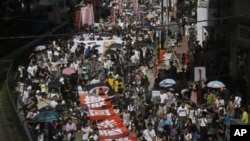This is the VOA Special English Education Report.
Thousands of protesters -- including teachers, students, parents and pro-democracy activists -- marched in Hong Kong last Sunday. They were protesting a plan to teach Chinese patriotism classes in Hong Kong schools.
(SOUND)
"We don't want brainwashing. We want the truth," these girls say.
Organizers said ninety thousand people marched to the government headquarters. But police gave a lower estimate of thirty-two thousand.
The Hong Kong government says the classes are meant to build Chinese national pride. The government plans to require the classes in elementary schools, starting in twenty-fifteen. But the government is urging schools to voluntarily launch the program when schools reopen this September.
The curriculum includes a teaching booklet called "The China Model." It praises the one-party rule of the Communist Party. It says nothing, for example, about the crushing of pro-democracy protests in Beijing in nineteen eighty-nine.
(SOUND)
Ting Kwing-chan has been teaching primary school for thirty-eight years. He says he was not persuaded by the booklet. "I don't even believe the content myself, so it's difficult to teach my students," he says.
(SOUND)
Chan Yip-Long, a nine-year-old student in the march, said: "China wants to unify Hong Kong. Our next generation only knows how great China is, but not the bad stuff."
(SOUND)
Protester Paul Yeung, a parent of two children, says he worries that too much "one-sided education is not good for the mental development of young people."
The protest was another sign of public concern about what critics see as the Chinese government's interference in the former British colony. Britain returned Hong Kong to China on July first, nineteen ninety-seven. China promised to let the territory largely govern itself.
Last month, more than one hundred thousand people joined a pro-democracy march on July first. It was the largest such gathering in eight years. Many of the protesters demanded that the city's new leader resign. Leung Chun-ying took office earlier that day. He was chosen by a mostly pro-Beijing committee.
Willy Lam is a China specialist in Hong Kong.
WILLY LAM: "People in Hong Kong -- including teachers and parents -- have lost trust in the disinterested or neutral nature of the Hong Kong government regarding education, regarding the media and so forth. So they are afraid that the C.Y Leung administration is enforcing orders by Beijing to try to promote loyalty to the Communist Party, loyalty to the Chinese administration, instead of trying to impart knowledge about China in a fair and open-minded manner."
And that's the VOA Special English Education Report. I'm Steve Ember.
___
Contributing: Associated Press
Thousands of protesters -- including teachers, students, parents and pro-democracy activists -- marched in Hong Kong last Sunday. They were protesting a plan to teach Chinese patriotism classes in Hong Kong schools.
(SOUND)
"We don't want brainwashing. We want the truth," these girls say.
Organizers said ninety thousand people marched to the government headquarters. But police gave a lower estimate of thirty-two thousand.
The Hong Kong government says the classes are meant to build Chinese national pride. The government plans to require the classes in elementary schools, starting in twenty-fifteen. But the government is urging schools to voluntarily launch the program when schools reopen this September.
The curriculum includes a teaching booklet called "The China Model." It praises the one-party rule of the Communist Party. It says nothing, for example, about the crushing of pro-democracy protests in Beijing in nineteen eighty-nine.
(SOUND)
Ting Kwing-chan has been teaching primary school for thirty-eight years. He says he was not persuaded by the booklet. "I don't even believe the content myself, so it's difficult to teach my students," he says.
(SOUND)
Chan Yip-Long, a nine-year-old student in the march, said: "China wants to unify Hong Kong. Our next generation only knows how great China is, but not the bad stuff."
(SOUND)
Protester Paul Yeung, a parent of two children, says he worries that too much "one-sided education is not good for the mental development of young people."
The protest was another sign of public concern about what critics see as the Chinese government's interference in the former British colony. Britain returned Hong Kong to China on July first, nineteen ninety-seven. China promised to let the territory largely govern itself.
Last month, more than one hundred thousand people joined a pro-democracy march on July first. It was the largest such gathering in eight years. Many of the protesters demanded that the city's new leader resign. Leung Chun-ying took office earlier that day. He was chosen by a mostly pro-Beijing committee.
Willy Lam is a China specialist in Hong Kong.
WILLY LAM: "People in Hong Kong -- including teachers and parents -- have lost trust in the disinterested or neutral nature of the Hong Kong government regarding education, regarding the media and so forth. So they are afraid that the C.Y Leung administration is enforcing orders by Beijing to try to promote loyalty to the Communist Party, loyalty to the Chinese administration, instead of trying to impart knowledge about China in a fair and open-minded manner."
And that's the VOA Special English Education Report. I'm Steve Ember.
___
Contributing: Associated Press




